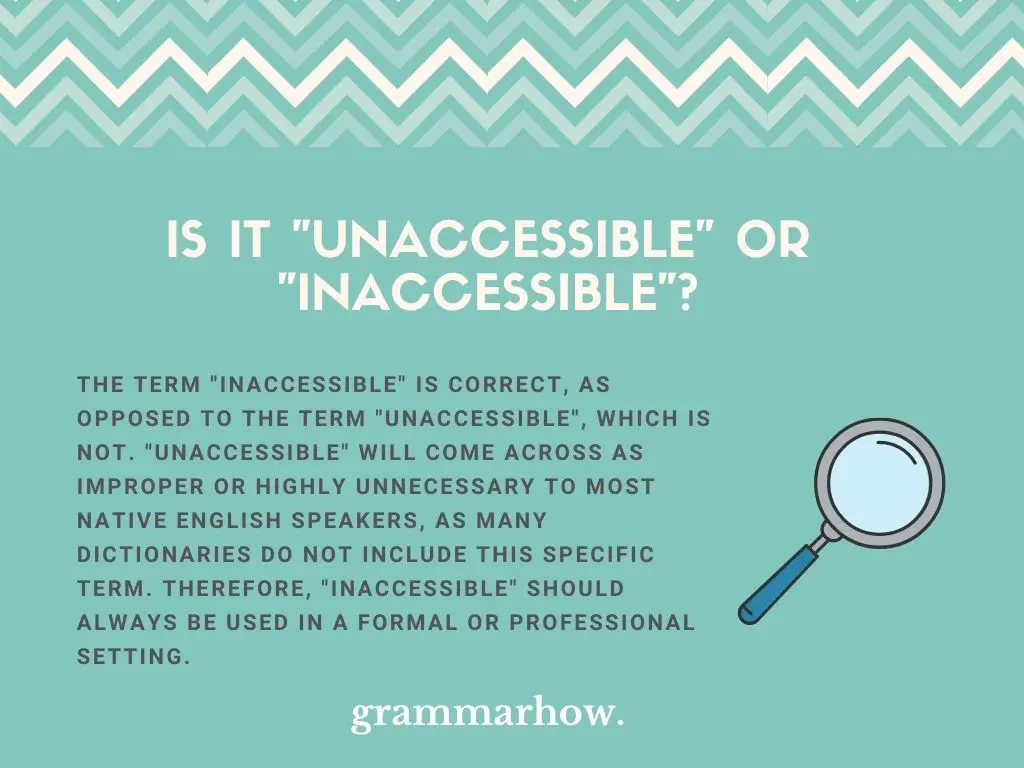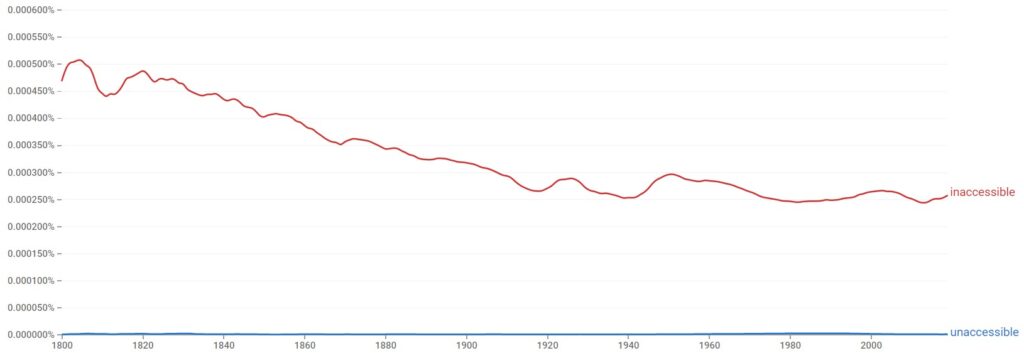The terms “unaccessible” and “inaccessible” are seemingly quite consistent in both spelling and sound. This can sometimes make it quite confusing for folks to understand which is the proper term to use. In this article, we will go over these terms, their meanings, and which one is appropriate to use.
Is It “Unaccessible” or “Inaccessible”?
The term “inaccessible” is correct, as opposed to the term “unaccessible”, which is not. “Unaccessible” will come across as improper or highly unnecessary to most native English speakers, as many dictionaries do not include this specific term. Therefore, “inaccessible” should always be used in a formal or professional setting.

The reasoning for this has a lot to do with the prefixes of both “unaccessible” and “inaccessible”.
The prefix “un” is thought of as the most prolific in the English language. It was widely used in Old English; however, it underwent a mass extinction in the early ages of Middle English. It heavily disputes the Latin-derived “in”, which forms the negation of certain words, like “inaccessible”, “infamous”, or “indigestible”.
Though both prefixes may be used in cooperation to indicate similar meanings, like “unaccessible” with “inaccessible”, generally this is considered redundant or unnecessary.
Is It Ever Correct To Use “Unaccessible”?
We can choose to use the term “unaccessible”, merely because there are some dictionaries that define this as a proper term. However, “unaccessible” does share the same definition as “inaccessible”, which is always considered to be a proper term. Therefore, using “unaccessible” may be considered improper by some English speakers.
Because of this, we should choose to use the term “inaccessible”, as opposed to “unaccessible” – especially when writing or speaking in a formal or professional environment. We can see that even when typing or attempting to Google the term “unaccessible”, we are prompted to change the term to “inaccessible”.
When looking at Vocabulary.com, we can see that “unaccessible” is defined as being capable of being reached only with great difficulty or not at all.
The Free Dictionary also defines “unaccessible” as capable of being reached only with great difficulty or not at all.
Whereas Merriam-Webster Dictionary defines “unaccessible” as “inaccessible”.
When looking at the data provided by Google Ngram Viewer, we can see that the use of “unaccessible” is incredibly minuscule in comparison to the use of “inaccessible”. As previously mentioned, this is due to “inaccessible” being thought of as the appropriate term to utilize.

What Does “Inaccessible” Mean?
As “inaccessible” is the more commonly used term, it’s important to be aware of the definition. According to Cambridge Dictionary, “inaccessible” is defined as very difficult or impossible to travel to or reach, difficult to obtain, or difficult to understand or admire.
When looking at Merriam-Webster Dictionary, we can see that “inaccessible” is defined as not being accessible.
Examples Of How To Use “Unaccessible” And “Inaccessible” In A Sentence?
We will now go over some examples that highlight the use of “unaccessible” and “inaccessible” in a sentence. It’s important to keep in mind that generally, “unaccessible” would be considered incorrect to use in place of “inaccessible” – especially to a native English speaker.
Here are the examples to read over:
- Correct: The resort was inaccessible to minors.
- Incorrect: The resort was unaccessible to minors.
- Correct: Medication is inaccessible without a prescription.
- Incorrect: Medication is unaccessible without a prescription.
- Correct: The campsites are inaccessible without a boat.
- Incorrect: The campsites are unaccessible without a boat.
- Correct: The entrance is inaccessible to folks in wheelchairs.
- Incorrect: The entrance is unaccessible to folks in wheelchairs.
- Correct: Her thoughts were inaccessible to her boyfriend.
- Incorrect: Her thoughts were unaccessible to her boyfriend.
- Correct: That town is inaccessible without a snowmobile.
- Incorrect: That town is unaccessible without a snowmobile.
“Inaccessible” Synonyms
We will now look over some appropriate synonyms that we can use in place of “inaccessible”:
- Unreachable
- Distant
- Impassable
- Remote
- Unattainable
- Unavailable
- Impervious
- Unapproachable
- Isolated
- Out Of The Way
- Off The Map
- In The Middle Of Nowhere

Martin holds a Master’s degree in Finance and International Business. He has six years of experience in professional communication with clients, executives, and colleagues. Furthermore, he has teaching experience from Aarhus University. Martin has been featured as an expert in communication and teaching on Forbes and Shopify. Read more about Martin here.
